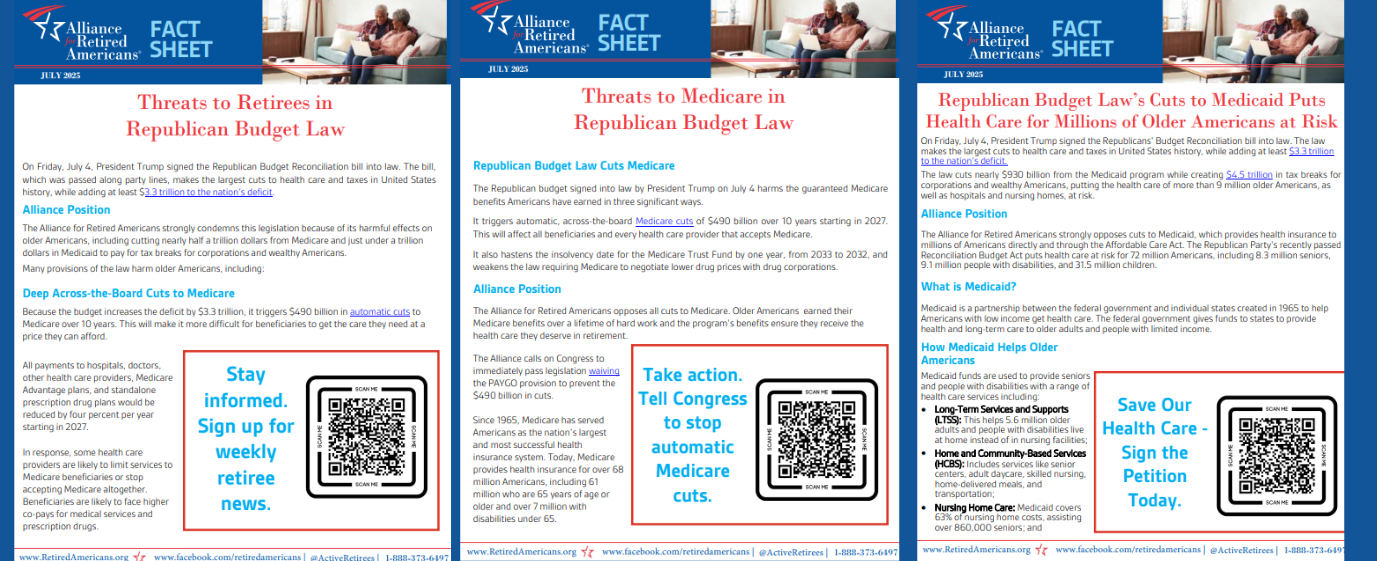|
|
SSA Commissioner Sends Misleading Email to Millions of Americans, Buries a Correction Online Days Later |
|
Last week, Social Security Administration (SSA) Commissioner Frank Bisignano sent an email praising the passage of the Republican tax and budget law and incorrectly saying that it “includes a provision that eliminates federal income taxes on Social Security benefits for most beneficiaries.”
The unusually political message went to 71 million Americans who have online MySSA accounts and was widely criticized for inaccurately describing the law. President Trump and White House officials have repeatedly claimed that the budget package eliminates taxation of Social Security benefits. It does not.
The law offers a temporary tax deduction to some people over the age of 65. Whether or not someone’s tax bill goes down depends on their combined income from Social Security, pensions, retirement accounts, investments, and work. Seniors whose total income is between $50,000 and $200,000 are most likely to see a change, but many beneficiaries will see no change at all.
However, unlike the tax cuts for the wealthy and corporations, this deduction ends in 2028 — just three years after starting. It will weaken Social Security, reducing trust fund revenue by about $30 billion a year and lowering the projected timing of insolvency from 2033 to 2032.
The SSA quietly issued a correction on its website four days after sending Commissioner Bisignano’s initial email, but did not email a correction to everyone who received the first message.
“It’s highly disappointing to see the Social Security Commissioner distribute misleading, inaccurate information to millions of Americans,” said Robert Roach, Jr., President of the Alliance. “At a minimum, he should send an email with a correction to every person who received his first message.” |
|
Hospitals and Nursing Homes Are Preparing for the Worst Now That Republican Budget is Law |
|
Many community hospitals and nursing homes are bracing for major financial hits now that President Donald Trump has signed the Republican budget bill into law.
The bill includes over $1 trillion in cuts to Medicaid over the next decade. Researchers estimate that over 300 hospitals will either have to reduce vital services or shut down completely. One in four nursing homes will also be forced to close, and thousands of good health care jobs will be eliminated.
Rural hospitals will be especially vulnerable. Over 20 percent of the country’s population lives in rural areas — roughly 66 million people — and one in four adults in these areas are covered by Medicaid. Many patients will lose access to local health care, forcing them to take long journeys to reach the closest facility and increasing burdens on the remaining hospitals.
The Senate voted to allocate $50 billion for a Rural Health Transformation Program in the wake of Medicaid cuts, but it won’t be enough to help rural hospitals stay afloat. The Republican budget bill is estimated to reduce federal spending in rural areas by around $155 billion.
“Every legislator who voted yes for this budget bill was warned of the danger to constituents and the health care system, but approved it anyway,” said Richard Fiesta, Executive Director of the Alliance. “This is too high a price to pay so the wealthiest Americans can get even richer. Our members will remember their votes.”
Our retirement security is at risk. Stay up to date by downloading the Alliance’s fact sheets and share them with your friends and family members: |
|
The Republican budget law includes a provision that excludes more drugs from Medicare drug price negotiation, a major win for the pharmaceutical industry.
The legislation creates a loophole that exempts medicines that treat more than one rare disease from drug price negotiation. These so-called “orphan drugs” include lifesaving cancer medicines such as Imbruvica, Calquence, and Pomalyst.
The Congressional Budget Office estimates that the ORPHAN Cures Act will cost American taxpayers $5 billion over the next ten years.
“This is a blatant giveaway to drug corporations that will be able to keep drug prices sky-high and protect their monopoly pricing power,” said Joseph Peters, Jr., Secretary-Treasurer of the Alliance. “It is not only bad news for any senior who needs one of these drugs, but it chips away at the drug price negotiation law that Alliance members fought hard to pass.” |
|
KFF Health News: To Keep Medicaid, Mom Caring for Disabled Adult Son Faces Prospect of Proving She Works By Bram Sable-Smith |
|
Four years before Kimberly Gallagher enrolled in Medicaid herself, the public health insurance program’s rules prompted her to make an excruciating choice — to give up guardianship of her son so she could work as his caregiver.
Now, another proposed twist in the rules could mean that, even though Missouri pays her to do that work, she might still have to prove to the state that she’s not unemployed.
The Kansas City, Missouri, resident has cared for her disabled son, Daniel, for all 31 years of his life. A rare genetic condition called Prader-Willi syndrome, in addition to autism, left him with an intellectual disability; a constant, excessive hunger; and an inability to speak. His needs left Gallagher, an elementary school teacher by training, with little opportunity to work outside her home.
As congressional Republicans slash about $1 trillion in federal Medicaid spending, Gallagher is among the 18.5 million Americans who could be required to prove that they work enough to keep their health insurance.
|
|
Thanks for reading. Every day, we're fighting to lower prescription drug prices and protect retirees' earned benefits and health care. But we can't do it without your help. Please support our work by donating below. |
|
|
|
|
Alliance for Retired Americans | 815 16th Street, NW | Washington, DC 20006 | www.retiredamericans.org


